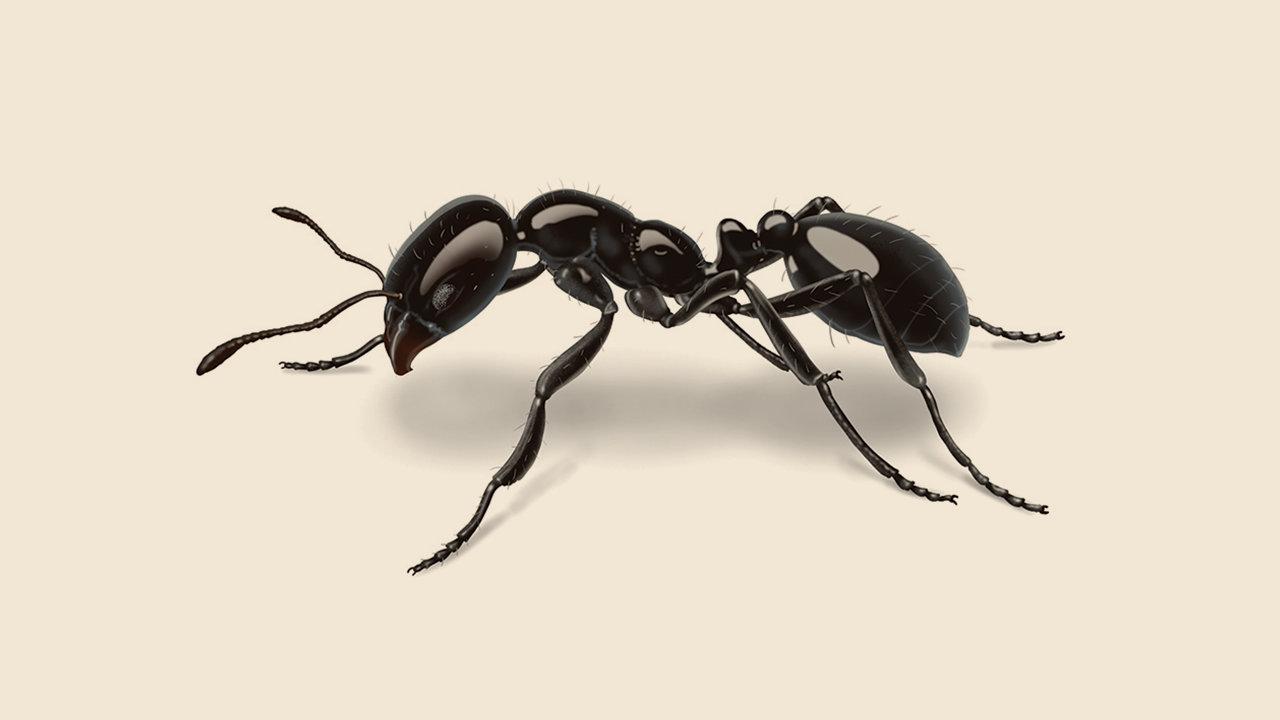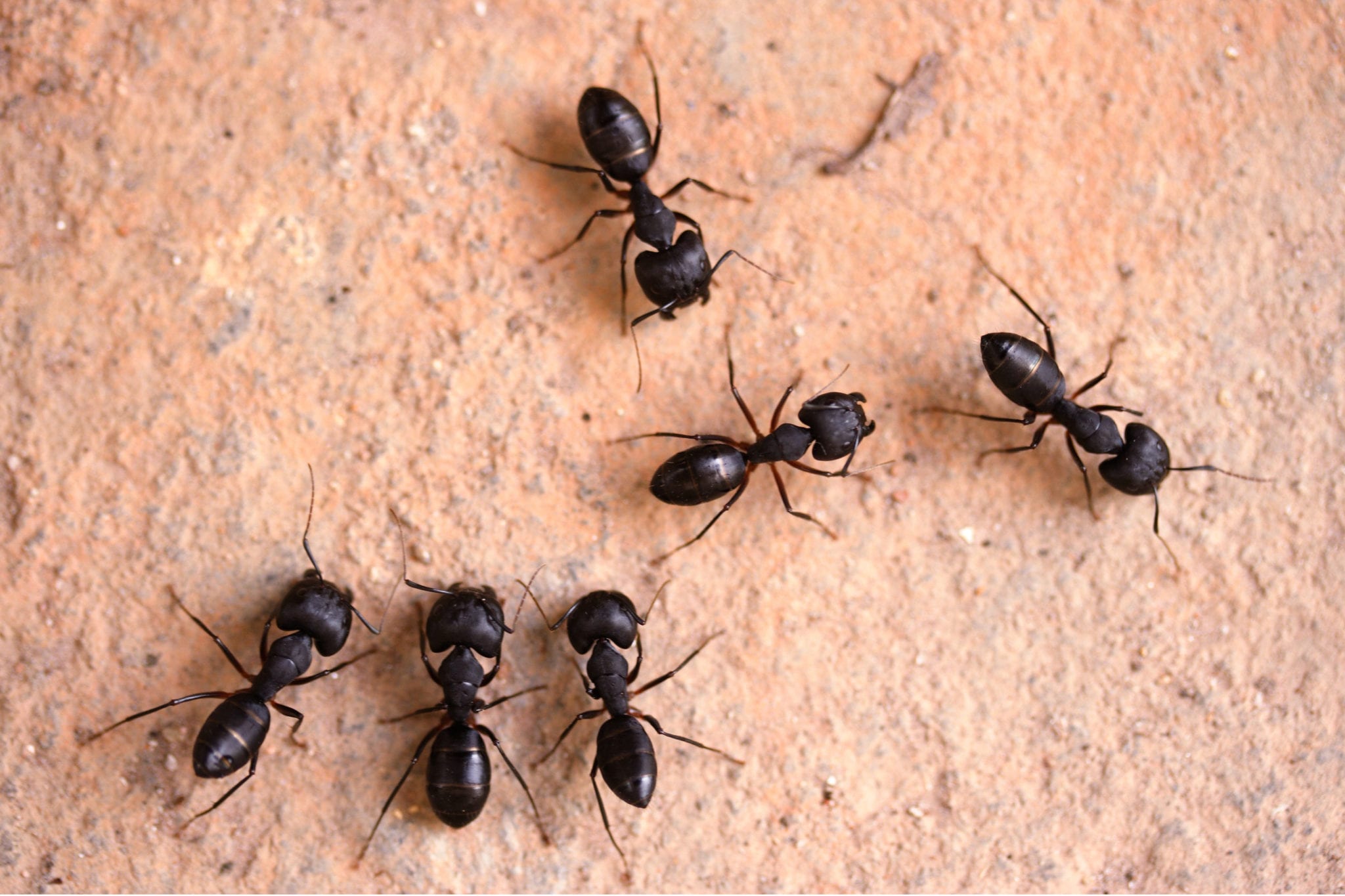Identifying the Ant Species: Large Black Ants In Bedroom

Large black ants are a common sight in many homes, and their presence can be both a nuisance and a cause for concern. Identifying the specific species of ant can be helpful in determining the best course of action for control.
Physical Characteristics
Large black ants, as the name suggests, are typically black in color and are among the largest ant species found in homes. They can range in size from 3 to 10 millimeters in length, with workers being smaller than the queen. Their bodies are segmented, with a distinct head, thorax, and abdomen. They have six legs and two antennae.
Behavior and Nesting Habits, Large black ants in bedroom
Large black ants are social insects that live in colonies. They have a complex social structure with a queen, workers, and males. The queen is responsible for laying eggs, while workers perform tasks such as foraging, caring for the young, and defending the colony. They often build their nests in the soil, under rocks, or in wood.
Common Types of Large Black Ants
- Carpenter Ants: These ants are known for their ability to excavate wood, creating galleries and tunnels. They are typically dark brown or black and have a distinctive heart-shaped thorax. They prefer moist wood and are often found in areas with water damage.
- Pavement Ants: These ants are smaller than carpenter ants and have a more reddish-brown color. They are commonly found in sidewalks, driveways, and other paved areas. They are attracted to sugary foods and can be a nuisance in kitchens and pantries.
- Odorous House Ants: These ants are small and have a distinctive odor that resembles coconut. They are commonly found in homes and are attracted to sweet foods and greasy substances.
Understanding Ant Infestations

Ants are social insects that live in colonies. They are attracted to various food sources, moisture, and warmth, making bedrooms a suitable environment for them.
Reasons for Ant Infestations in Bedrooms
Large black ants, like carpenter ants, are attracted to bedrooms due to several factors. These factors can be categorized into three main areas: food sources, moisture, and warmth.
- Food Sources: Ants are drawn to food crumbs, spills, and even pet food. Even a tiny crumb left on the floor can attract a colony of ants.
- Moisture: Ants need water to survive. They are often attracted to areas with high humidity, such as bathrooms and kitchens. Damp spots in your bedroom, like leaking pipes or condensation, can also attract them.
- Warmth: Ants prefer warm environments. Bedrooms are typically warm and provide a comfortable habitat for ants, especially during colder months.
Risks Associated with Ant Infestations
Ant infestations can pose various risks to your health and home. These risks include:
- Allergic Reactions: Some people are allergic to ant stings or bites. These reactions can range from mild itching to severe swelling and breathing difficulties.
- Food Contamination: Ants can contaminate food and surfaces, making them unsafe for consumption. They can carry bacteria and other pathogens that can cause food poisoning.
- Structural Damage: Certain types of ants, like carpenter ants, can cause structural damage to your home. They build their nests in wood and can weaken the structure of your walls, floors, and ceilings.
Preventing Ant Infestations
To prevent ant infestations in your bedroom, follow these simple strategies:
- Maintain Cleanliness: Regularly clean your bedroom, especially under beds, behind furniture, and in corners. Wipe up spills immediately and store food in airtight containers.
- Seal Entry Points: Inspect your bedroom for any cracks, gaps, or holes in the walls, floors, or windows. Seal these entry points with caulk or sealant to prevent ants from entering.
- Eliminate Food Sources: Keep your bedroom free of food crumbs, spills, and other potential food sources. Regularly clean up any food that has fallen on the floor or furniture.
Effective Ant Control Methods
:max_bytes(150000):strip_icc()/Getting-rid-of-ants-at-home-2656296-V2-8e3db57a6ee44c5c9bfde226ac38f73c.png)
Getting rid of large black ants in your bedroom can be a challenge, but with the right approach, you can effectively control the infestation. Here are some methods you can use, ranging from simple DIY solutions to professional services.
Chemical Treatments
Chemical treatments are a common approach for controlling ant infestations. They offer quick and effective results, but it’s crucial to use them responsibly and safely.
- Insecticides: Insecticides are available in various forms, including sprays, granules, and baits. They contain active ingredients that kill ants on contact or by ingestion. When using insecticides, follow the manufacturer’s instructions carefully and ensure adequate ventilation. Keep children and pets away from treated areas until the product has dried completely.
- Ant Baits: Ant baits are a popular choice as they target the entire colony. They contain a slow-acting poison that ants carry back to their nest, eliminating the queen and other ants. Place baits strategically near ant trails and in areas where ants are frequently seen. Baits can be more effective than sprays, as they can eliminate the entire colony, but they may take longer to work.
Natural Remedies
If you prefer a more natural approach, there are several remedies that can help deter ants.
- Essential Oils: Certain essential oils, such as peppermint, tea tree, and cinnamon, have a strong scent that ants dislike. Dilute a few drops of essential oil in water and spray it around areas where ants are present. You can also place cotton balls soaked in essential oil near ant trails.
- Diatomaceous Earth: Diatomaceous earth is a natural powder made from fossilized algae. It’s abrasive to insects and can dehydrate them, leading to their death. Sprinkle diatomaceous earth around entry points and along ant trails. It’s important to note that diatomaceous earth can be harmful to pets and children if ingested. Keep it out of reach of children and pets.
- Borax: Borax is a natural mineral that can be used as an ant control agent. Mix borax with sugar and water to create a bait that ants will find attractive. Place the bait in areas where ants are present. Borax is toxic to ants, but it can also be harmful to children and pets if ingested.
Professional Pest Control Services
For severe infestations or if DIY methods haven’t been successful, it’s advisable to contact a professional pest control service. They have the expertise and tools to effectively eliminate ants and prevent future infestations.
- Professional services offer a variety of treatment options, including:
- Targeted treatments: Professionals can use targeted treatments to eliminate ant colonies without affecting other areas of your home.
- Preventive measures: They can also help you identify and seal entry points to prevent future infestations.
Large black ants in bedroom – Those large black ants in your bedroom might seem like an insurmountable problem, but remember, even the most daunting challenges can be overcome with the right approach. A calm and serene environment can be a powerful tool in any battle, and that’s where a navy cream and grey bedroom can come in.
This color scheme exudes tranquility, allowing you to focus on finding a solution to those pesky ants, and ultimately, reclaim your space.
Those large black ants in your bedroom can be a real nuisance, but don’t let them get you down! Think about it – if you were an ant, wouldn’t you be drawn to a space as inviting as a grey and yellow wallpaper bedroom ?
The key is to make your room less appealing to them – clean up crumbs, seal cracks, and consider using natural deterrents like peppermint oil. You’ve got this!
